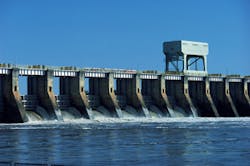Power 'GridLab' Trains Next Generation of Hydroelectric Plant Technicians and Managers
According to information from automation systems vendor Opto 22, Bismarck State College in North Dakota is adding an extensive power GridLab to their series of labs for training the next generation of control and energy technicians and managers.
While the hydroelectric plant is virtual—a hydraulic model built in OptoScript and running on an Opto 22 controller—most of the equipment in Bismarck's labs is real: thermal and flow process trainers, solar array, wind turbine, and much more. Students control equipment and analyze data either in person or online.
"We've been developing these remote laboratories for a decade now, and Opto 22 products have been a large part of our designs," says Zachery Allen, National Energy Center of Excellence Project Manager at the college.
Allen finds that control with Opto 22 products is straightforward, and he appreciates the ability to easily communicate with other devices and systems using standard protocols like TCP/IP and Modbus/TCP.
The new power GridLab (PGL) will cover all the school's distributed generation equipment, major labs, buildings, even an electric vehicle.
The HMI is natively web-based and can be run by students worldwide as well as those on campus. (See the laboratory portal:http://www.bscnecelabs.net). The lab will offer a hands-on way to experiment with smart grid technologies, including demand response (DR) events and real-time pricing changes for electricity.
Since most of the equipment is real, Allen notes that safety is of the utmost importance. “Opto 22 products allow us to program our safety functions and provide oversight of students. For example, a student might try to open a circuit breaker in the PGL, but the PAC allows or prevents the operation after determining if the action will cause damage to other equipment.”
Bismarck State College offers a number of technical training programs online and on the campus, including instrumentation and control, mechanical maintenance, petroleum production, water/wastewater, and nuclear power, plus a Bachelor of Applied Science (BAS) in Energy Management.
About the Author
Renee Bassett
Managing Editor

Leaders relevant to this article:
